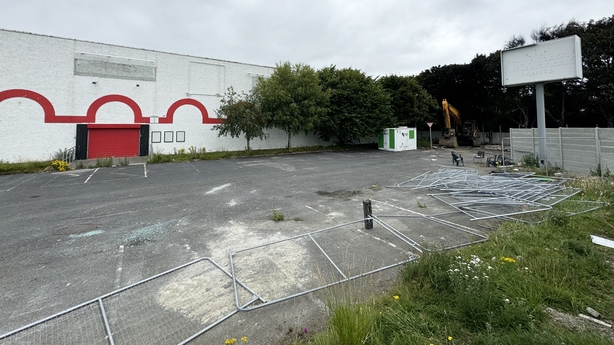The developer of a former factory in Dublin, which has been designated to house International Protection applicants, has secured an interim High Court injunction preventing "persons unknown" from engaging in threatening or intimidating behaviour at the Coolock site.
However, a request to put in place a 100m "cordon sanitaire" around the premises was turned down.
Earlier this week, 19 people were arrested after clashes at the former Crown Paints factory on the Malahide Road over Government plans to accommodate asylum seekers at the premises.
At one point, 200 gardai were on duty to deal with the demonstrations.
Developer Remcoll and leaseholder Townbe applied to the High Court today for a number of reliefs.
Their Senior Counsel Bernard Dunleavy said there was a grave urgency about the matter.
He described the disturbances on Monday as "very significant", resulting in a serious amount of damage, adding that a security guard was "very badly injured" after being hit with a steel bar and was hospitalised for two days.
The protests were described in court as "absolutely wild" and like the demonstrators "lost all sense of reason".
Mr Dunleavy said there had been a low-level presence of people since March, but that no work had been undertaken to transform the site.
He said his clients were in a position to start work but worry that, if they return, they will be met with the same level of violence.
The developers, Mr Dunleavy added, have particular expertise in providing "high-spec" accommodation, are significantly motivated by a "social mission", and the fit out and remodelling was principally for Ukrainian nationals.
He said his clients had experienced violent protests before but nothing on the scale of what had happened in Coolock.

Mr Dunleavy also referred to photographs of the scene which he said showed people "in hoodies fronting up" to gardaí and referred to social media posts taken before and after Monday’s events which he described as "quite insidious" and "radical and extremist".
He read from some posts in which his client was identified as an "enemy of the State" and a "traitor".
Another was captioned "take him out," the court was told.
In granting the interim injunction, Mr Justice Rory Mulcahy said the plaintiffs remained apprehensive that if they seek to resume work, protests will escalate and potentially turn violent in the absence of court interventions.
He turned down their application for a 100m "cordon sanitaire" - essentially a cordon without physical barriers - saying he was concerned about the "geographical scope" of what was being sought.
Mr Justice Mulcahy said it would have interfered with access to roads and local businesses and the right to peaceful protest.
The injunction restrains people from impeding or obstructing access to the property and engaging in behaviour calculated to threaten employees or contractors.
Notices of the injunction will be displayed at the site. The matter is due back before the courts next week.
Yesterday, Minister for Integration Roderic O’Gorman confirmed said the site in Coolock will be used to accommodate asylum seekers.
He said his department would work with gardaí and the accommodation provider to house up to 500 applicants there.







